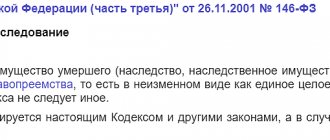Privatization of housing means the transfer of all rights to an apartment from a municipal or state authority to an individual (or several individuals to new owners). Once such a procedure is carried out, the new owner has the right to own and dispose of real estate at his own discretion, including leaving it as an inheritance, that is, bequeathing it. But what to do if a citizen living in a non-privatized apartment under a social tenancy agreement did not have time to privatize the apartment and died? What about his relatives, can they count on inheriting a non-privatized apartment after the death of the tenant?
In this publication, we will try to understand who can apply for such housing and who cannot, as well as the intricacies of the procedure for inheriting a non-privatized apartment by the heirs of the deceased who occupied housing under a social tenancy agreement.
- Grounds for inheriting non-privatized housing
- Privatization of the apartment of a deceased tenant through the court
- Who can inherit a non-privatized apartment
- Stages of registering an inheritance for a non-privatized apartment
- Who cannot apply for a non-privatized apartment
Is it possible to bequeath a non-privatized apartment?
The owner of the property can assign the apartment to his relatives or third parties. If necessary, you can bequeath property to an enterprise or the state. The only condition is that the property must belong to the citizen by right of ownership, i.e. in the presence of a certificate of ownership or an extract from the Unified State Register of a new sample (Article 218 of the Civil Code of the Russian Federation).
This means that if the apartment is not privatized, then it cannot be bequeathed.
A similar rule applies to common shared or jointly acquired property by spouses. The owner can only dispose of his part (shares) of the property.
What to do if the property is not privatized?
Such property cannot be inherited due to its status - it is municipal property. Residents are only assigned the right to use the property (Article 7 of Law No. 1541-1 of 07/04/1991).
If the employer (tenant) has submitted an application for privatization of housing and has already begun to prepare the necessary documents, the housing can be assigned to the heirs in the event of sudden death.
Why is this allowed? It's all about timing - checking and processing documents takes at least two months, which means the procedure is delayed through no fault of the applicant (Article 8 of Law No. 1541-1).
The importance of apartment privatization for heirs
After privatization, assets are allowed to be inherited. Upon completion of the procedure, the citizen receives a certificate of ownership. But if the testator did not manage to register the property in his name and it remained non-privatized, then problems arise with transferring it to his successors.
If the tenant of the residential premises began to register the apartment in his name, but died without completing the procedure, then the property is not inherited. At the same time, close relatives have the right to continue privatization or enter into a new social rental agreement.
It is better not to delay the registration process, since timely receipt of ownership of the apartment will save the heirs from legal proceedings. When the deceased did not have time to re-register the apartment, he does not have the right to transfer it as an inheritance, which means that the successors cannot lay claim to property owned by the state.
Is it possible to inherit a non-privatized apartment?
The Supreme Court granted citizens the right to inherit real estate that is in the process of registration (Resolution of the Plenum of the Supreme Court No. 8). The main criterion is the presence of documentary evidence of the citizen’s will regarding the privatization of the object.
If a citizen has submitted an application and entered into an agreement on privatization, his relatives (heirs) can inherit.
However, they will have to go to court to recognize ownership or include the apartment in the inheritance.
Terms of registration of privatization
Privatization, of course, is an additional legal process that takes some time. However, it is quite possible to start privatization within the six-month deadline for re-registration of the inheritance. Inheritance of non-privatized housing refers to the third, sometimes even fourth degree of complexity in conducting inheritance cases. That is why the process must begin immediately after the date of potential opening of the inheritance. When the design was launched under the former owner, there is a much greater chance of meeting existing standards. If privatization took too much time, the six-month period can be extended through the court.
Grounds for inheriting housing
The only basis for accepting housing as an inheritance is the submission of an appropriate application by the responsible tenant (he is the main participant in the transaction for the transfer of a municipal apartment for citizens to live in):
- If the tenant with whom the social tenancy agreement has been concluded has not begun the procedure for transferring the housing into private ownership, the relatives will not be able to inherit the apartment.
- If it turns out that the application for privatization is withdrawn by the testator, the right of inheritance for the relatives of the deceased citizen also does not arise.
Thus, a lot is connected with the actions of the testator himself - it depends on him whether the heirs will be able to register non-privatized housing as private property.
Nuances of the procedure
When the issue of inheriting a non-privatized apartment is raised, close relatives are not always the heirs. The most important thing to remember is that close relatives who lived with the deceased person have the greatest chances in any situation.
If we are talking about distant relatives, then they will have a chance of getting an apartment if the deceased managed to begin the privatization process during his lifetime. In all other cases, the apartment will remain in municipal ownership and, most likely, will find new residents in the near future.
If the apartment is not privatized, who has the right to inheritance after death?
The primary claimants to the assets of a deceased relative are children, parents, and spouse. The order of inheritance can be changed using a will. The testator is allowed to determine the composition of participants and the size of shares of the property of recipients (heirs).
However, we should not forget about socially vulnerable citizens. Such persons are entitled to a mandatory share of the inheritance (Article 1149 of the Civil Code of the Russian Federation). Initially, this includes the minor children of the testator. The rule applies not only to blood children, but also to adopted children.
The law also protects the interests of disabled parents, spouses and dependents of a deceased citizen. The will must not infringe on the interests of these persons. The exception is the recognition of the heir as unworthy—in other words, as a violator of the terms of inheritance. If there is a court decision, such citizens are excluded from inheriting the property of the testator, regardless of the rule on the mandatory part.
What will happen to the municipal apartment after the death of the main tenant?
Who will get the apartment after the sudden death of its owner is not much of a guess. The order of inheritance is strictly determined by law, but at the same time, when a citizen bothers to write a will, the housing can be transferred, in violation of general rules, to distant relatives or, for example, to strangers or to charity. There is only one principle here - the owner has the right to dispose of his property as he sees fit. It will be possible to challenge his last will only in court.
How to receive a non-privatized apartment according to a will?
To exercise his right to inheritance, a citizen needs to contact a notary. If the ownership of the home is not formalized, the heirs will be denied a certificate of inheritance. The notary will invite the relatives of the deceased person to go to court. Moreover, it does not matter whether a testamentary disposition was drawn up or whether it is missing. When preparing a statement of claim, you must be guided by the provisions of the Code of Civil Procedure of the Russian Federation and the clarifications of the Plenum of the Armed Forces of the Russian Federation. Today there is positive judicial practice on issues of inheritance of non-privatized property.
Can I file a claim right away? Initially, you need to contact a notary so as not to miss the deadline for accepting the inheritance - 6 months from the date of opening of the inheritance . At the same time, you can file a claim, since non-privatized housing may not be the only object of inheritance. The purpose of going to court is to include housing in the inheritance. If the applicant turned to the notary on the eve of the expiration of the deadline and received a reasoned refusal to issue a certificate of inheritance, you can immediately file a claim for recognition of property rights.
Order and procedure
Interested parties need to prepare documents. The statement of claim is filed at the place of residence of the deceased employer. Civil cases are heard by magistrates and district (city) courts.
The application is made in writing, accompanied by evidence of the stated facts. The defendant is the state represented by the municipality. When filing a claim, you must also pay a state fee (see below).
Procedure:
- Establish the fact of death of the apartment tenant.
- Contact the registry office for a death certificate.
- Make an appointment with a notary, provide documents, a will.
- Receive a refusal to issue a certificate of inheritance.
- Go to court with a claim to include the property (non-privatized apartment) in the inheritance.
- Attend court hearings and read the decision.
- Take the court writ of execution to the notary's office.
- Complete the inheritance procedure.
Statement of claim
Below is a typical sample claim. If necessary, you can add relevant sections and circumstances.
Required documents
A package of documents must be attached to the statement of claim. The documents must clearly support the stated claims. Minimum list of papers:
- a copy of the statement of claim;
- death certificate of the employer;
- evidence of relationship with the deceased citizen;
- housing privatization agreement with the local administration;
- act of transfer of real estate;
- notarized application for inheritance;
- motivated refusal of the notary;
- appraisal document on the value of the property;
- proof of payment of state duty.
The list of documents is not exhaustive. If there are additional participants or circumstances, it can be expanded. The main thing is that the papers are relevant to the case.
Expenses
The basic cost item is state duty. This must be paid before filing a claim. The receipt is attached to the package of documents and the claim. The absence of a bank document may lead to refusal to accept the application (Articles 134-136 of the Code of Civil Procedure of the Russian Federation). The amount of the fee is calculated based on the value of the disputed property. In this case, the amount of the state duty consists of two parts (fixed rate + percentage of the difference in indicators).
Example. The testator wrote 2-room. a non-privatized apartment for his daughter. According to Rosreestr, the inventory value of a share in real estate was 182,312 rubles. Calculation of the amount of state duty – 4847 (3200 + 1647) rubles.
How to inherit a non-privatized apartment according to the law
The procedure for applicants is the same as when inheriting non-privatized housing under a will. The only difference is the absence of an order that determines the range of applicants. When inheriting by law, the primary heirs are children, parents, and living spouse.
Order and procedure
The heirs of the deceased citizen need to visit a notary and submit an application. If the property is not privatized, the heirs will be denied a certificate. After this, you can begin to prepare papers for the court.
The procedure for entering into inheritance according to the law:
- Collect documents confirming the fact of relationship with the deceased.
- Visit a notary, write an application.
- If you refuse, prepare for the trial (file a claim, collect documents, pay the state fee).
- Attendance at court hearings, receiving the final court decision.
- Repeated application to the notary for the issuance of a certificate.
Statement of claim
When going to court, you need to briefly outline the circumstances of the case. One of the points of the claim is a description of the fact of filing an application with a notary office. The claim will need to be accompanied by a reasoned refusal from the notary. Additionally, you need to refer to Resolution of the Plenum of the Supreme Council No. 8. The Supreme Court has already considered similar issues. Also, do not forget to display the value of the disputed object. Based on this, the amount of state duty is calculated.
You can download a sample statement of claim from the section above.
Required documents
The same documents as in the previous section are attached to the statement of claim. Only the will of the deceased is excluded from the list.
Expenses
When filing a claim, you must pay a state fee. It is calculated based on the cost of the claim . To determine the amount of the fee, you must contact Rosreestr for assessment work. You can also obtain information on the official portal of the government agency.
The most convenient way to calculate the amount of the state duty is on the website of the judicial authority - the calculation calculator will allow you to determine the nature of the dispute, the stated requirements and the amount of the state duty that follows them.
Who is entitled to inherit non-privatized housing?
Only certain categories of heirs can apply to inherit housing that has not undergone the privatization procedure. This applies directly to persons who lived in the same living space with the testator and act as his heirs (regardless of the basis: in accordance with the contents of the will or by law).
Important! If the heir did not live in the same living space with the testator, then there are no options for registering it as property by inheritance.
Arbitrage practice
If there is proper evidence, courts periodically satisfy the claims of heirs to include non-privatized real estate in the inheritance. Also, the heirs are recognized with the right of ownership of housing. less than 6 months have passed on the date of adoption of the judicial act , then the court includes the property as part of the inheritance. After the expiration of the terms, the heirs are usually recognized as having ownership rights.
Possible disputes among heirs in court:
- Reinstatement of missed deadlines for filing an application at a notary's office.
- Establishing family ties with the deceased - for inheriting an apartment by law or by the right of compulsory share.
- The exclusion of individual heirs from the general circle is due to the status of “unworthy”.
- Accounting or exclusion of the property of the deceased from the inheritance.
Example. The court received a claim for recognition of property rights within the framework of inheritance. There were three applicants. The defendant was the Administration of the municipal formation of the Ulyanovsk region. The plaintiffs explained that after the death of their mother, an unregistered, non-privatized apartment was left behind. The will of the testator to privatize housing is confirmed by a statement. However, the woman did not have time to complete the paperwork. The case materials also included an agreement to transfer ownership of the living space. Due to the lack of a complete package of documents, the heirs cannot take over the rights. However, the deceased woman did not withdraw her application for privatization. The claims were satisfied. The plaintiffs were recognized as having ownership of the real estate (Decision of the Barysh City Court of the Ulyanovsk Region dated April 6, 2012, case No. 2-157/2012).
An entry in Rosreestr is made on the basis of a judicial act. Separately, a court decision is not a document of title to housing. This should be remembered when contacting Rosreestr to obtain an extract from the USRN (replaces certificates of ownership).
Where to go
The main transactions related to the registration of non-privatized inheritance take place with the direct participation of a notary. Of course, the case of inheriting non-privatized residential property will not be an exception. However, before delving into working with a notary’s office, you will have to submit documents to the property registration authorities. The registration chamber is precisely such an authority.
According to paragraph one of Article 1154 of the Civil Code, after submitting a complete package of papers about a non-privatized object to the registration chamber, reviewing the documents, recognizing all as valid, the closest relative himself can begin to play the role of an employer instead of a testator.
He will have this status until he completes the procedure for transferring ownership. As a rule, it is much easier to privatize an apartment after the death of the owner for those relatives who actually lived with the former owner. If the registration chamber refuses to give the go-ahead for privatization, and the case takes a judicial turn, you can always provide witnesses who will prove the fact of cohabitation, therefore, the moral right to own residential property.
We recommend reading: How to register an inheritance for an apartment after the death of your mother
Is it possible for relatives of the deceased to use a non-privatized apartment?
If family members are indicated in the social tenancy agreement, then they have the same rights as the main tenant of the residential premises. Consequently, after his death, the relatives retain the right to use the property - living in the apartment under the same conditions. The testator's relatives can re-sign the social tenancy agreement in their name. The concluded agreement will serve as the basis for further privatization of the property.
Please note that family members will also have to re-register personal accounts to pay rent + utilities in a municipal apartment.
Relatives who did not live together with the tenant cannot enter into a social rental agreement and privatize an apartment, even if they are close relatives (wife, parents, children). It is believed that they are not entitled to a social apartment because they do not belong to the low-income category of citizens.
To re-register a social tenancy agreement, you need to provide a package of documents. This includes:
- previous agreement with a deceased citizen;
- passport;
- documents confirming the right to the occupied living space - an extract from the house register (archive).
Below is a sample application:
If the homeowner refuses to renew the social tenancy agreement, the relatives of the deceased citizen will have to go to court. To privatize housing you need to prepare the following papers:
- passport of a citizen of the Russian Federation;
- application for privatization;
- social tenancy agreement or old housing order;
- paper from BTI;
- an extract from the house register - about the composition of the family;
- an extract from Rosreestr indicating non-participation in privatization to date.
After checking the papers, an agreement is concluded with the applicant on the transfer of ownership of the property. After completing the necessary papers, the property becomes the property of the relatives of the deceased citizen.
What is not subject to privatization
According to the law, there are apartments that are prohibited from being privatized. Typically these are properties that are in poor condition or have a special status.
What premises are prohibited from privatization:
- in dilapidated houses subject to demolition;
- in dormitories intended for temporary residence of students, seasonal workers, out-of-town specialists, etc.;
- in closed garrisons;
- in buildings performing service functions.
Since property cannot be privatized, inheritance of such a municipal apartment is impossible. But close relatives can continue to rent housing without the opportunity to register it in their name.










